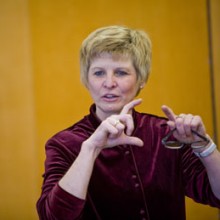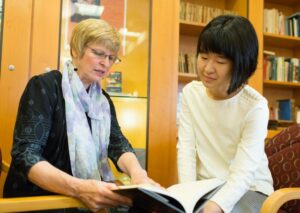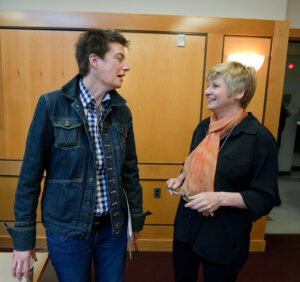Farewell tribute to Margarete Lamb-Faffelberger
Professor Margarete B. Lamb-Faffelberger, first and foremost, you are a dedicated and award-winning teacher of German language and culture, a renowned scholar of Austrian literature and film, and a nationally recognized leader in digitally mediated language pedagogies. You received your Ph.D. from Rice University. You joined Lafayette’s Department of Foreign Languages and Literatures as an assistant professor in 1992; you were tenured and promoted to associate professor in 1998 and promoted to professor in 2006.
 During your vibrant tenure at the College, Professor Lamb-Faffelberger, you worked ceaselessly to transform German studies at Lafayette into an internationally recognized program of study. For you, “making a difference” in a student’s life often entailed what you could do for them outside the classroom, as an adviser, not only in the selection of their courses but also in terms of imparting sound advice on the better path to take while writing an honors thesis under your supervision, or, among many other activities, how to work effectively together with others as a group in performing a play in the German language.
During your vibrant tenure at the College, Professor Lamb-Faffelberger, you worked ceaselessly to transform German studies at Lafayette into an internationally recognized program of study. For you, “making a difference” in a student’s life often entailed what you could do for them outside the classroom, as an adviser, not only in the selection of their courses but also in terms of imparting sound advice on the better path to take while writing an honors thesis under your supervision, or, among many other activities, how to work effectively together with others as a group in performing a play in the German language.
Professor Lamb-Faffelberger, you were the recipient of the Thomas Roy and Lura Forrest Jones Faculty Lecture Award and the Aaron O. Hoff Outstanding Advisor of the Year Award in 1999, the Delta Upsilon Distinguished Mentoring and Teaching Award in 2003, and the Christian R. and Mary F. Lindback Award for Distinguished Teaching in 2018.
Professor Lamb-Faffelberger, you have established and maintained strong relationships with German-speaking scholars, writers, and artists as well as representatives in the Austrian Embassy and through these relationships have brought dozens of scholars in residence to Lafayette to share their work with our community and our colleagues and to partner in teaching our students.

Margerete Lamb-Faffelberger and Danhui Zhang ’18
Indeed, one of your most significant achievements, Professor Lamb-Faffelberger, has been the founding and directorship of the Max Kade “eco-system” in 2003, which includes a center for German and Austrian cultural studies as well as the Max Kade Haus, a beautifully restored residence and meeting space on McCartney Street that serves as home to the many German-speaking artists, writers, and playwrights who come to campus each year to serve as scholars in residence. Through your affiliation with the Max Kade Foundation, you also played an instrumental role in securing scholarship monies for engineering students studying abroad in Germany.
Lately, you have helped lead the successful transition into a new study abroad program for our engineering students in Bonn, Germany, a program you yourself have directed. In addition, you have directed summer study in Germany and interim courses abroad, most recently in South Africa.

Margarete Lamb-Faffelberger and Professor Imke Meyer of Bryn Mawr College
Professor Lamb-Faffelberger, you are a recognized expert on the work of avant-garde Austrian author Elfriede Jelinek, who won the Nobel Prize in Literature in 2004. You have been the general editor for the Austrian Culture Series published by Peter Lang and served as the co-editor for the Women in German Yearbook.
Throughout your years at Lafayette, Professor Lamb-Faffelberger, you have made important contributions to your department, the College, and your profession. You have served capably as department head from 2004 to 2010, protecting and cultivating all of the programs and hiring and mentoring numerous faculty in multiple languages. In addition to numerous committee activities, you served on the advisory committee that helped develop the program in film and media studies. You also served for many years as the faculty adviser for Delta Phi Gamma, the German honorary society, and in this role have hosted the annual award ceremony at your home. As one colleague recalled, “Just as the Romans created at Vindobona (Vienna) a nexus of the ancient world, at a crossroads that gave access to the Rhine and the Black Sea on the one hand, to the Baltic and the Adriatic on the other, so, in the modern College Hill Era, Margarete created at 140 Parker Avenue a crossroads for Lafayette faculty members, administrators, and students whose interests and conversation ranged far afield. All who attended gratefully remember Margarete for her kind and gracious hospitality.”
1 Comment
REMEMBRANCES OF MY ERSTWHILE COLLEAGUE AND FRIEND MARGARETE LAMB FAFFELBERGER ON THE OCCASION OF HER RETIREMENT
While the unfortunate circumstance that at the moment of this writing requires us to practice “social distancing” and thus prevents our gathering close at hand in our customary manner to jointly recognize one of our very own who is about to embark on that new path dubbed “blissful retirement,” I nevertheless — despite having to do so “remotely” — want to avail myself of this opportunity to express (from afar) my admiration and respect for Margarete Lamb Faffelberger, my erstwhile longtime colleague and equally longtime friend.
I remember that day in 1991 when a younger version of myself, then Chair of a Search Committee, journeyed with Professor Catherine Perricone to the annual meeting of the Modern Language Association where we were to conduct interviews of several highly qualified candidates with the expressed purpose of filling a full-time position in German and Women’s Studies. It was there at the MLA conference during the “the official interview”–or shall I say our cordial chat–I had my first glimpse into both Margarete’s professionalism and amiability as my future colleague; an instantly sensed congeniality that lent warmth to that cold December morning.
What ensued in the many collegial years to come was Margarete’s unswerving dedication to the many students with whom she came into contact throughout her twenty-nine years of accomplished tenure here at Lafayette College. During this time, she touched all of our lives and although I am no longer active within the Department of Foreign Languages and Literatures, it saddens me to know that with her leave-taking, the German Section will no longer have the privilege of experiencing her competent leadership on an everyday basis.
From her earliest days as a student at the Pädigogische Akademie in her native Austria throughout her graduate studies at the University of Illinois in Urbana and Rice University in Houston, Texas, Margarete had it in mind to become an engaged teacher. If one of the more difficult aspects of teaching at any level is getting students to become “turned on” to learning, Margarete never had any problem in motivating them. Both her rapport with and commitment to her students proved catching, for these combined pedagogical qualities compelled them to become equally and personally engaged in their continuing education.
For Margarete, “making a difference” in a student’s life also often entailed what she could do for them outside the classroom, as an advisor, not only in the selection of their courses but also in terms of imparting sound advice on the better path to take while writing an honors thesis under her supervision; or too how to work effectively together with others as a group in performing a play in the German language et al.
While Margarete has been an amazing teacher, for me she was always a personable colleague and friend. Whenever we in the German Section gathered together for a “brainstorming meeting,” she was always quick to share her knowledge, be that in the form of crucial ideas on the interface of teaching and learning to that of upgrading the curriculum, usually with the intent of suiting any transformation to cultural changes that were informing the lives of our incoming first-year students.
During her vibrant tenure here she worked incessantly at raising the German Section’s enrollment figures and helped transform the program from one that when viewed on a national scale provided significant versatility to its majors and double majors into one whose reputation grew internationally. It was no mean feat on Margarete’s part to convince the Max Kade Foundation’s trustees of the suitability for the establishment of a Max Kade Center for German and Austrian Cultural Studies at Lafayette College, and then after having successfully achieved the lofty goal, to assume the directorship of the newly formed Center, a role that demanded boundless energy in order to sustain the necessary commitment to its wellbeing. In this regard, she took on the burden of extending invitations to renowned writers-in-residence and scholars of international distinction with whom she had had professional contact. Thus, they came here to Lafayette College where she worked with them and advanced students in a seminar aimed at enhancing student-faculty research.
It has been said that great educators are somewhat like artists, yet while the educator–unlike a sculptor–might not be able to immediately mold the human material, the student, nevertheless by directly engaging a student’s mind and spirit in the learning process, a great educator can make a lasting impression on the minds of students. In so doing, the difference educators make is in helping shape students’ lives to the extent that they, these young people who have “only just begun,” might eventually realize their respective goals and conceivably develop into that specific person, which each had hoped someday to become in this world.
Margarete, I esteem you as one of the great artists of the teaching profession.
I thank you for your many selfless contributions to Lafayette College and our students and having said that, I wish you years upon years of happiness in your retirement.
Your friend from way back when until now,
Ed